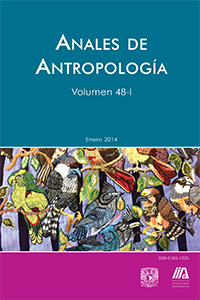A ethnohistorical travel of cacao symbolism in the Food imaginaries in Mexico
Main Article Content
Abstract
Within the anthropology of food, cultural dimension is vital to understand different ideologies in the meanings of food, as they create preferences or aversions in any person or society, cultural events called “imaginaries”, and these are the key elements to understand the diversity in the ways of eating.
Cooking and eating, as well as preparing and tasting food, introduce specialized functions and pleasures and shared responsibilities, create social bonds that go beyond the simple act of sharing a meal. It is also important within the human individuality, as the food varies according to the mood: it is not the same eating when sad, angry, happy, or frustrated; in religion, the act of feeding plays a role in the various sacramental acts of societies, even some products are sacred or profane by its symbolism.
This will be explained by the case of our ancestral cocoa in Mexico, for it had several food uses within both the physical body and the mood. Then there I will discuss its possible meanings.
Downloads
Article Details
Citas en Dimensions Service
Esta revista usa una licencia CC del tipo CC BY-NC-ND 3.0. Se maneja bajo el esquema de acceso abierto, con una licencia Creative Commons Attribution-NonCommercial-NoDerivs 3.0 Unported.
